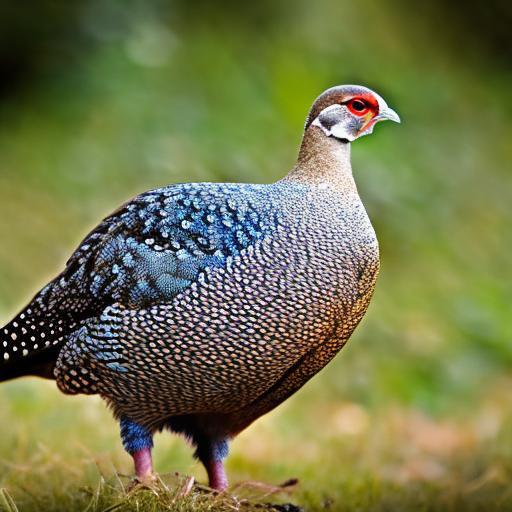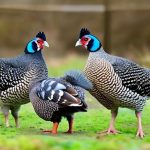Keeping guinea fowl in the suburbs has become increasingly popular in recent years as more people seek sustainable and natural pest control solutions for their properties. Guinea fowl are known for their ability to control insect populations, making them a valuable addition to any suburban homestead. These unique birds are also prized for their flavorful meat and eggs, making them a versatile and valuable addition to any small farm or backyard. However, keeping guinea fowl in the suburbs does come with its own set of challenges and considerations, which we will explore in this article.
Guinea fowl are a type of game bird that are native to Africa, but have been domesticated and are now commonly kept in suburban and rural settings around the world. They are known for their distinctive appearance, with speckled feathers and a helmet-like crest on their heads. Guinea fowl are also highly social birds, often forming close-knit flocks that roam and forage together. In addition to their pest control abilities, guinea fowl are also valued for their alert nature, making them excellent watchdogs for the suburban homestead. In this article, we will explore the benefits of keeping guinea fowl in the suburbs, as well as the considerations, housing requirements, feeding and care, potential challenges, and tips for successfully keeping guinea fowl in a suburban setting.
Key Takeaways
- Guinea fowl are a great addition to suburban households, providing pest control and entertainment.
- Keeping guinea fowl can help control insect populations and reduce the need for chemical pesticides.
- Considerations for keeping guinea fowl in the suburbs include noise levels, zoning regulations, and predator protection.
- Guinea fowl require adequate housing and space to roam in the suburbs, with a minimum of 250 square feet per bird.
- Feeding and caring for guinea fowl in the suburbs involves providing a balanced diet and regular health checks.
Benefits of Keeping Guinea Fowl in the Suburbs
There are numerous benefits to keeping guinea fowl in the suburbs, making them an attractive option for homeowners looking to add a natural pest control solution to their property. One of the primary benefits of keeping guinea fowl is their ability to control insect populations. Guinea fowl are voracious insect eaters, consuming large quantities of ticks, mosquitoes, flies, and other pests that can be a nuisance to both humans and animals. By allowing guinea fowl to roam freely on your property, you can significantly reduce the need for chemical insecticides and other pest control measures, creating a more natural and sustainable environment for both your family and your pets.
In addition to their pest control abilities, guinea fowl are also valued for their flavorful meat and eggs. The meat of guinea fowl is lean and richly flavored, making it a popular choice for gourmet chefs and home cooks alike. Guinea fowl eggs are also prized for their rich flavor and high nutritional content, making them a valuable addition to any suburban homestead. By keeping guinea fowl on your property, you can enjoy a sustainable source of high-quality meat and eggs, reducing your reliance on store-bought products and supporting a more self-sufficient lifestyle. Overall, the benefits of keeping guinea fowl in the suburbs are numerous, making them a valuable addition to any small farm or backyard.
Considerations for Keeping Guinea Fowl in the Suburbs
While there are many benefits to keeping guinea fowl in the suburbs, there are also several important considerations to keep in mind before bringing these unique birds onto your property. One of the primary considerations is noise. Guinea fowl are known for their loud calls and vocalizations, which can be disruptive to neighbors in close proximity. Before bringing guinea fowl onto your property, it’s important to consider how their vocalizations may impact those around you, and to take steps to minimize any potential disturbances.
Another important consideration is space. Guinea fowl are highly active birds that require plenty of room to roam and forage. If you have a small suburban property, it’s important to carefully consider whether you have enough space to accommodate a flock of guinea fowl without causing overcrowding or stress. Additionally, guinea fowl are known for their strong flying abilities, so it’s important to ensure that your property is properly fenced to prevent them from wandering into neighboring yards or onto nearby roads.
Finally, it’s important to consider the needs of your existing pets and wildlife when introducing guinea fowl to your suburban property. While guinea fowl are excellent at controlling insect populations, they may also compete with other birds and wildlife for food and resources. It’s important to carefully consider how introducing guinea fowl may impact the existing ecosystem on your property, and to take steps to minimize any potential conflicts.
Housing and Space Requirements for Guinea Fowl in the Suburbs
When it comes to housing and space requirements for guinea fowl in the suburbs, there are several important factors to consider. Guinea fowl are highly active birds that require plenty of room to roam and forage, so it’s important to provide them with a spacious outdoor area where they can exercise and explore. A minimum of 250 square feet per bird is recommended to ensure that they have enough space to move around comfortably.
In addition to outdoor space, guinea fowl also require a secure and predator-proof coop or shelter where they can roost at night and seek protection from the elements. The coop should be well-ventilated and provide at least 2-3 square feet of space per bird. It’s important to provide plenty of roosting space and nesting boxes to accommodate the needs of your flock.
When it comes to fencing, it’s important to ensure that your property is properly enclosed to prevent guinea fowl from wandering into neighboring yards or onto nearby roads. Guinea fowl are strong flyers and can easily escape from poorly secured enclosures, so it’s important to invest in high-quality fencing materials and regularly inspect your perimeter for any signs of wear or damage.
Overall, providing adequate housing and space for guinea fowl in the suburbs is essential for ensuring their health and well-being. By carefully considering their needs and providing a safe and comfortable environment, you can create a successful home for your flock of guinea fowl.
Feeding and Care of Guinea Fowl in the Suburbs
Feeding and caring for guinea fowl in the suburbs requires careful attention to their dietary needs and overall well-being. Guinea fowl are omnivorous birds that require a balanced diet of high-quality feed, fresh water, and access to natural forage. A commercial game bird feed with at least 20% protein is recommended as the primary source of nutrition for guinea fowl. In addition to feed, guinea fowl also require access to fresh water at all times, as well as grit or coarse sand to aid in digestion.
In addition to commercial feed, guinea fowl also benefit from access to natural forage such as grasses, weeds, seeds, insects, and small invertebrates. Allowing guinea fowl to roam freely on your property can provide them with ample opportunities to forage for natural foods, which can help supplement their diet and provide essential nutrients.
When it comes to overall care, it’s important to regularly monitor the health and well-being of your flock. This includes checking for signs of illness or injury, providing regular access to dust baths or bathing water to help control parasites, and ensuring that their coop or shelter is clean and well-maintained.
Overall, providing proper feeding and care for guinea fowl in the suburbs is essential for ensuring their health and well-being. By meeting their dietary needs and providing attentive care, you can help your flock thrive in a suburban setting.
Potential Challenges of Keeping Guinea Fowl in the Suburbs

While there are many benefits to keeping guinea fowl in the suburbs, there are also several potential challenges that homeowners should be aware of before bringing these unique birds onto their property. One of the primary challenges is noise. Guinea fowl are known for their loud calls and vocalizations, which can be disruptive to neighbors in close proximity. Before bringing guinea fowl onto your property, it’s important to consider how their vocalizations may impact those around you, and to take steps to minimize any potential disturbances.
Another potential challenge is predation. Guinea fowl are vulnerable to predation from a variety of predators including foxes, raccoons, hawks, and dogs. It’s important to take steps to secure their coop or shelter against potential threats, as well as provide them with ample opportunities to seek cover and protection from predators while they are free-ranging on your property.
Finally, it’s important to consider the impact that introducing guinea fowl may have on the existing ecosystem on your property. While guinea fowl are excellent at controlling insect populations, they may also compete with other birds and wildlife for food and resources. It’s important to carefully consider how introducing guinea fowl may impact the existing ecosystem on your property, and to take steps to minimize any potential conflicts.
Conclusion and Tips for Keeping Guinea Fowl in the Suburbs
In conclusion, keeping guinea fowl in the suburbs can be a rewarding experience that provides numerous benefits including natural pest control, flavorful meat and eggs, and a unique addition to your homestead. However, it’s important to carefully consider the various aspects of keeping guinea fowl before bringing them onto your property. This includes providing adequate housing and space, meeting their dietary needs, monitoring their health and well-being, and taking steps to minimize potential challenges such as noise and predation.
If you’re considering keeping guinea fowl in the suburbs, here are a few tips to help you get started:
1. Research local regulations: Before bringing guinea fowl onto your property, it’s important to research local regulations regarding keeping poultry in your area. Some municipalities may have restrictions on the number of birds you can keep or specific requirements for housing and care.
2. Consider your neighbors: Guinea fowl are known for their loud calls and vocalizations, so it’s important to consider how their presence may impact those around you. It’s a good idea to talk with your neighbors before bringing guinea fowl onto your property to address any potential concerns.
3. Provide adequate housing and space: Guinea fowl require plenty of room to roam and exercise, as well as a secure coop or shelter where they can roost at night. It’s important to provide them with adequate housing and space to ensure their health and well-being.
4. Monitor their health: Regularly monitor the health of your flock by checking for signs of illness or injury, providing access to dust baths or bathing water, and ensuring that their coop or shelter is clean and well-maintained.
By carefully considering these tips and taking steps to provide proper housing, care, and consideration for your neighbors, you can successfully keep guinea fowl in the suburbs and enjoy the many benefits they have to offer.
If you’re considering keeping guinea fowl in the suburbs, you might also be interested in learning about the best vegetables for quails to eat. Check out this informative article on PoultryWizard to discover how to provide a nutritious and balanced diet for your quails. Understanding the dietary needs of different poultry can help you create a thriving and sustainable environment for your backyard flock.
FAQs
What are guinea fowl?
Guinea fowl are a type of bird native to Africa. They are known for their distinctive spotted feathers and loud, chattering calls.
Can guinea fowl be kept in the suburbs?
Yes, guinea fowl can be kept in the suburbs as long as local ordinances and regulations allow for it. It’s important to check with local authorities before keeping guinea fowl in a suburban area.
What are the benefits of keeping guinea fowl in the suburbs?
Guinea fowl are excellent at controlling insect populations, making them a natural pest control solution for suburban gardens and yards. They also provide entertainment with their unique behaviors and calls.
What are the challenges of keeping guinea fowl in the suburbs?
Guinea fowl can be noisy, especially during mating season, which may be a concern for neighbors. They also require adequate space to roam and forage, which can be a challenge in a suburban setting.
What do guinea fowl eat?
Guinea fowl are omnivorous and eat a variety of foods including insects, seeds, grains, and small fruits. They are excellent foragers and can help control pest populations in suburban areas.
Do guinea fowl require special housing in the suburbs?
Guinea fowl require a secure coop or housing at night to protect them from predators. During the day, they need access to a large, fenced area to roam and forage.
Are guinea fowl noisy?
Guinea fowl are known for their loud calls, especially during mating season. This can be a concern for neighbors in a suburban setting.
Do guinea fowl require any special care in the suburbs?
Guinea fowl require access to fresh water, a balanced diet, and protection from predators. They also benefit from social interaction with other guinea fowl.
Meet Walter, the feathered-friend fanatic of Florida! Nestled in the sunshine state, Walter struts through life with his feathered companions, clucking his way to happiness. With a coop that’s fancier than a five-star hotel, he’s the Don Juan of the chicken world. When he’s not teaching his hens to do the cha-cha, you’ll find him in a heated debate with his prized rooster, Sir Clucks-a-Lot. Walter’s poultry passion is no yolk; he’s the sunny-side-up guy you never knew you needed in your flock of friends!







